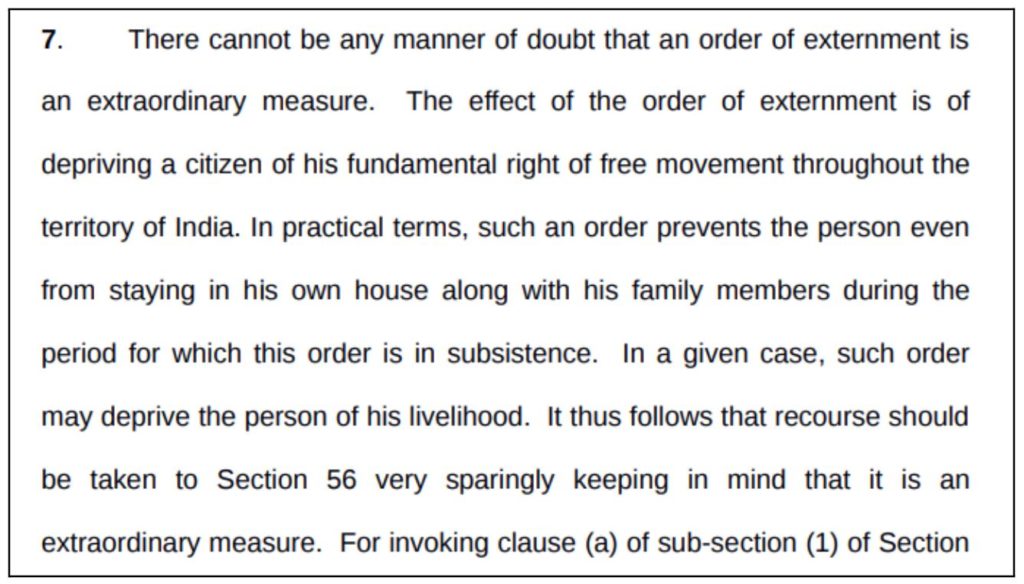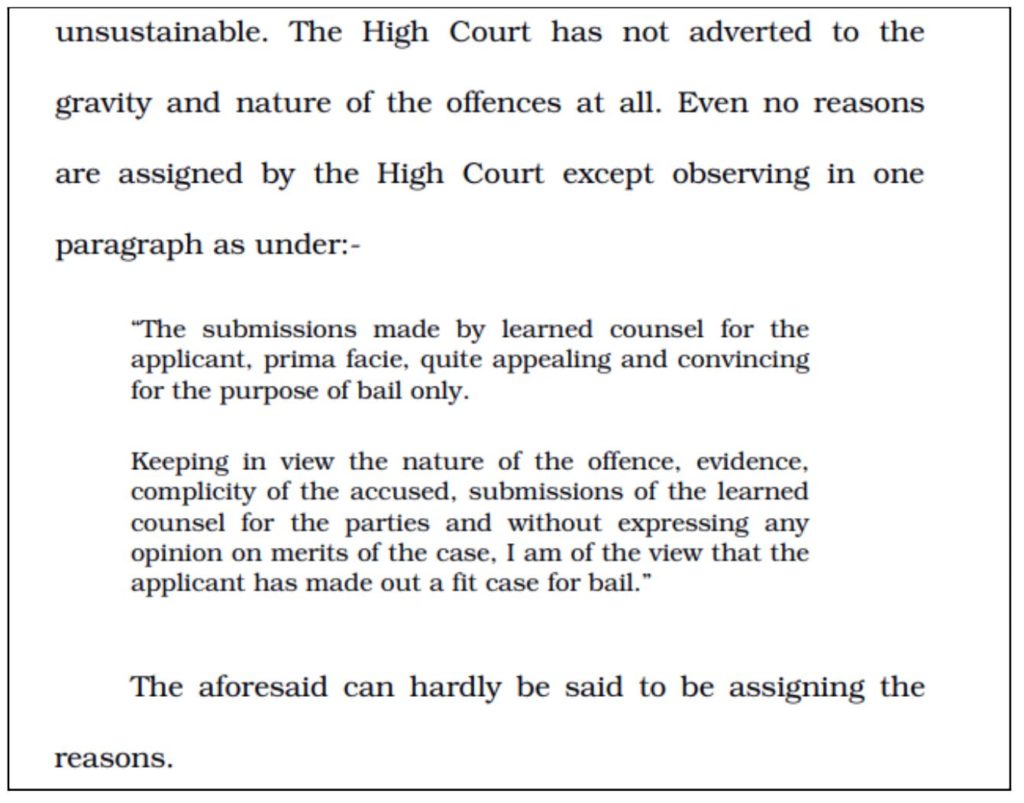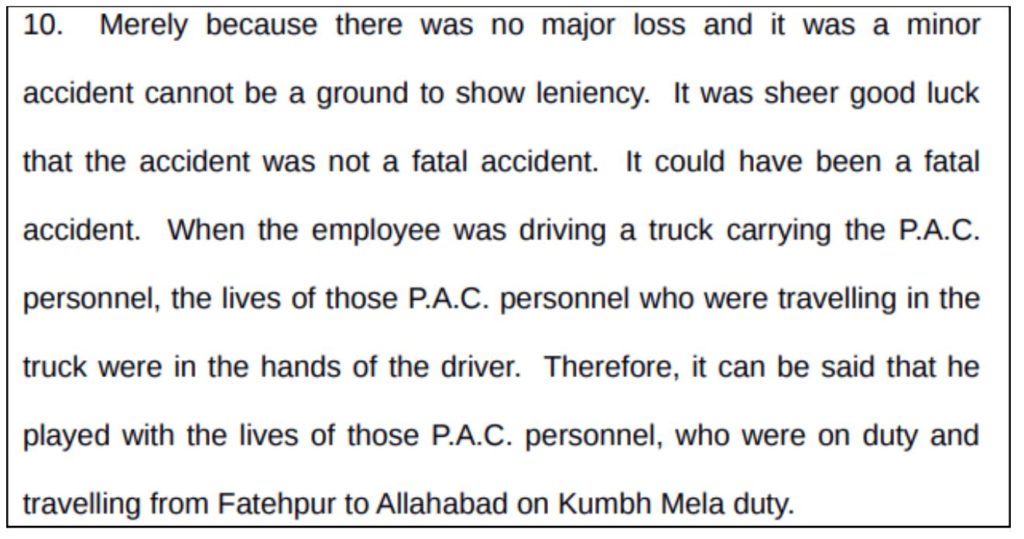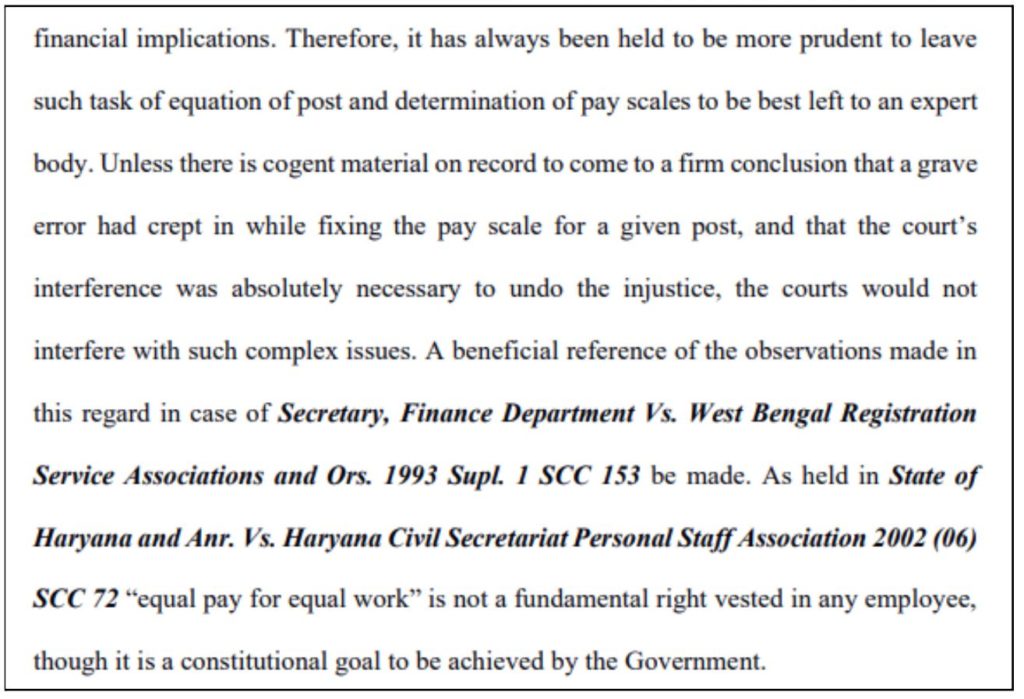In this roundup of Court Judgements, we look at the Supreme Court’s observations & directions on why the order of externment is not an ordinary measure and must only be used sparingly, about states responsibility to collect quantifiable data regarding inadequacy of representation of SCs and STs before providing reservations in promotions, on how the gravity and nature of the offences alleged against the accused are important factors while considering bail application, etc.
SC: Order of externment is not an ordinary measure and must be resorted to sparingly and in extraordinary circumstances
In Deepak S/o Laxman Dongre vs. State of Maharashtra, the appellant who was a resident of District Jalna, Maharashtra was directed to remove himself outside the limits of the district within 5 days for a period of two years. The order was passed by the competent authority invoking the powers under Maharashtra Police Act, 1951 on grounds that the appellant’s activities were very dangerous and the offences registered against him under the Indian Penal Code (IPC) were of a grave and serious nature which caused disturbance to the public at large. The order was challenged in the High Court which dismissed the petition.
While hearing the appeal, the Supreme Court (SC) Bench comprising Justices Ajay Rastogi and Abhay S. Oka observed that the effect of the order of externment is of depriving a citizen of his fundamental right of free movement throughout the territory of India. Therefore, the restriction imposed by passing an order of externment must stand the test of reasonableness. Earlier, the Court had held that the reasons which necessitate or justify the passing of an extraordinary order of externment arise out of extraordinary circumstances. The Bench also stated the following:

Furthermore, the Bench observed that there must be objective material on record based on which the competent authority must record its satisfaction that the movements or acts of any person are causing or calculated to cause alarm, danger, or harm to persons or property.
Noting the facts of the case, the Bench stated that non-application of mind is apparent on the face of the record and that the orders were passed casually in a cavalier manner. Considering that the competent authority passed an order for the maximum permissible period of two years, the Court added that the order of externment must disclose an application of mind and must record its subjective satisfaction about the necessity of passing such an order. Stating that the High Court did not notice that an order of externment is not an ordinary measure, and it must be resorted to sparingly and in extraordinary circumstances, the Supreme Court quashed the order of externment and the High Court’s judgment.
SC: States should collect quantifiable data regarding the inadequacy of representation of SCs and STs before providing reservations in promotions
In Jarnail Singh vs. Lachhmi Narain Gupta and Other Connected Matters, the Supreme Court Bench of Justices L Nageswara Rao, Sanjiv Khanna and B R Gavai heard a clutch of petitions arising out of judgments from different high courts pertaining to reservation policies since 2010.
The Court held that there was no fixed yardstick to identify equality, justice and efficiency which are variable factors, and it depends on the facts and circumstances of each case. Citing past cases, the Court stated that no yardstick can be laid down by it for determining the adequacy of representation of SCs and STs in promotional posts for providing reservation. The Court also held that it is for the State to assess the inadequacy of representation of SCs and STs in promotional posts, by considering relevant factors and that the Court is not persuaded to express any opinion.
The Court mandated that before providing for reservation in promotions to a cadre, the State should collect quantifiable data regarding the inadequacy of representation of SCs and STs. Further, it added that the collection of the said information should be relatable to the grade/category of posts to which promotion is sought and not the entire service or ‘class’/’group’ or else it would be meaningless. Cadre is defined as-

Furthermore, the Court observed that almost all parties had unanimously asked for a periodical review of the concerned data which the Court upheld. However, the Court refused to set out a time period and left it for the Government to decide.
SC: Gravity and nature of the offences alleged against the accused are important factors while considering the bail application
In Manno Lal Jaiswal vs. State of Uttar Pradesh, the appellant’s son was killed by the accused persons named in the FIR by attacking him with a sword, hockey stick, and rod. Noting this, the Sessions Court rejected the bail application. However, the accused persons moved the High Court to release them on bail. Applying wrong facts, the High Court released them on bail. The complainant, the father of the deceased then appealed to the Supreme Court.
The Supreme Court bench comprising Justices MR Shah and Sanjiv Khanna observed that the High Court had applied wrong facts and that it had not taken into consideration the gravity and nature of offences committed by the accused. Noting that the High Court had not at all adverted (referred) to the relevant facts and/or considerations while granting bail, the Bench also stated the following,

The Apex Court reiterated that the relevant considerations while considering a bail application are
- Nature of seriousness of offence
- The character of the evidence and circumstances which are peculiar to the accused
- Likelihood of the accused fleeing from justice
- The impact that his release may have on prosecution witnesses, its impact on the society
- Likelihood of his tampering
The High Court’s orders were quashed by the Court based on these factors.
SC: Merely because there was no major loss does not mean that leniency must be shown for driving under the influence of alcohol
In Brijesh Chandra Dwivedi (Dead) & Thr LRs vs. Sanya Sahayak & Ors, the appellant was a driver posted at the 12th Battalion, Provincial Armed Constabulary (PAC) at Fatehpur. While he was on duty, he drove a truck carrying the PAC personnel on Kumbh Mela Duty, which met with an accident with a jeep. On medical examination on the same day, it was found that he drove the truck under the influence of alcohol and caused the accident. A departmental enquiry was held, and the Inquiry Officer proposed punishment of dismissal. A second show-cause notice was issued by the Disciplinary Authority and after considering his reply, the punishment of dismissal was awarded.
This decision was challenged before the High Court with the argument that the punishment of dismissal is disproportionate to the misconduct proved. The High Court dismissed the writ petition stating that in the facts and circumstances of the case, a punishment of dismissal cannot be said to be disproportionate to the misconduct committed. Dissatisfied with the High Court’s decision, the appellant challenged the decision before the Supreme Court. However, during the pendency of the proceedings, the driver died, and his heirs were then brought on record.
A bench comprising Justices M R Shah and B V Nagarathna observed that driving a truck carrying PAC personnel under the influence of alcohol is a very serious misconduct and such an indiscipline cannot be tolerated and that too in the disciplined Military. The Bench said that merely because there was no major loss and it was a minor accident, it cannot be a ground to show leniency. Further, the Bench stated that driving a vehicle under the influence of alcohol is not only a misconduct but is also an offence. It added that nobody can be permitted to drive the vehicle under the influence of alcohol and that such a misconduct of driving a vehicle under the influence of alcohol and playing with the life of others is a very serious misconduct.
Further, the Bench considering the statement of the employee that he had consumed alcohol after the accident to suppress the fear, the punishment of dismissal was said to be too harsh and directed that the case may be treated as one for compulsory retirement.

SC: Equal Pay for Equal Work is not a fundamental right vested in any employee
In State of Madhya Pradesh vs. RD Sharma, a writ petition was filed in the High Court by R D Sharma, who had retired from the post of Principal Chief Conservator of Forest (PCCF) seeking revision of his pension from Rs. 37,750/- to Rs. 40,000/- as per the Indian Forests Service (Pay) Second Amendment Rules, 2008. The representation was rejected by the Department of Pension and Pensioners Welfare, and the Central Administrative Tribunal of Madhya Pradesh while the High Court of MP held that he was eligible for the pension of Rs. 40,000 at par with the other officers as per the 2008 Rules.
The State then filed an appeal in the Supreme Court. The Bench comprising of Justices DY Chandrachud and Bela M. Trivedi observed that the High Court had misdirected itself by applying the principle of “equal pay for equal work”. The Bench added that the equation of post and determination of pay scales is the primary function of the executive and not the judiciary. The task of job evaluation is generally left to the expert bodies like the Pay Commissions which takes into consideration various factors such as the relevant data and scales for evaluating performances of different groups of employees.

Quashing the High Court’s decision, the Supreme Court reiterated that “equal pay for equal work” is not a fundamental right vested in any employee, though it is a constitutional goal to be achieved by the Government. Additionally, the Bench noted that the Tribunal had rightly rejected the claim made by the appellant and that the Tribunal had not committed any jurisdictional error, nor any failure of justice had occurred. It noted that the interference of the High Court in an order passed by the Tribunal was unwarranted.
Featured Image: Important Court Judgements


